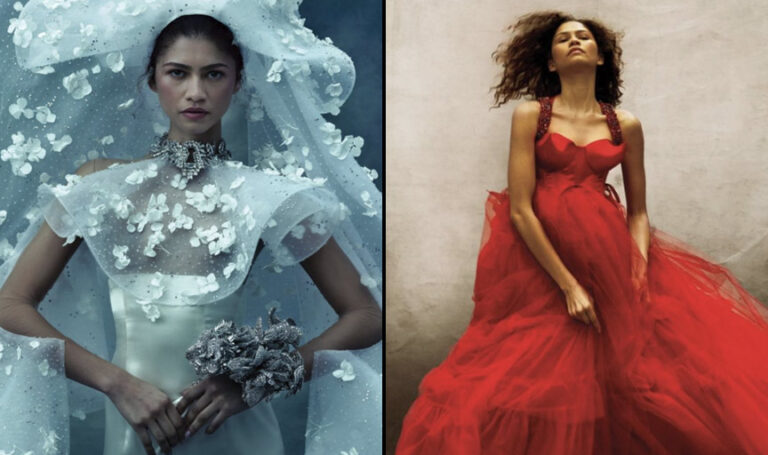Annie Leibovitz’s Zendaya Vogue shoot reignites call for Black photographers

Annie Leibovitz, the American photographer renowned for her intimate and iconic celebrity portraits, has found herself embroiled in numerous controversies over the past few years. Despite her illustrious career, Leibovitz’s reputation has been tarnished by accusations of her inability to capture Black women in a flattering light. This criticism stems from numerous instances where her photography failed to do justice to the beauty of melanated skin tones, with poor lighting that often results in lacklustre portrayals.
The latest round of outrage emerged following Leibovitz’s recent Vogue shoot featuring actress and Gen Z icon Zendaya. Social media quickly erupted with theories alleging that the photographer intentionally portrays ethnic-minority subjects in an unflattering manner. Netizens have also argued that she was using editing or lighting techniques that she typically refrained from when photographing white public figures.
While some netizens disagreed with the critique, it’s evident that this conversation has been ongoing for quite a while now. This is not the first time Leibovitz has faced backlash for her handling of Black women in photography.
Previous instances include photo shoots with Simone Biles, Lupita Nyong’o, Viola Davis, Serena Williams, and Rihanna. They have all drawn criticism for their lack of vibrancy and grace. Observers noted how the lighting in these images failed to complement darker skin tones, appearing dull, ashy, and devoid of vitality.
Guess which one is from Annie Leibovitz.
— Ernest Owens (@MrErnestOwens) August 17, 2022
HINT: It's not the glowing one of Viola Davis being photographed with care, love, and consideration for her beautiful dark skin.
It's 2022 and we shouldn't be having this conversation anymore. pic.twitter.com/6wt5FIXi1W
Even portraits of prominent Black figures, such as Supreme Court Justice Ketanji Brown Jackson, have come under scrutiny for their uninspiring portrayal. People specifically took issue with Leibovitz’s decision to showcase former president Abraham Lincoln’s towering statue in the background, suggesting that it overshadowed Jackson’s significance in the photograph.
One Twitter user expressed her frustration with Leibovitz and Vogue’s approach, highlighting the perceived misrepresentation of Jackson’s legacy and suggesting that there had been a deliberate oversight in glamorising powerful women.
This is horrible. How did you manage the 1). Poor lighting of this Black woman, 2). De-center her in her own narrative, and 3). Make a dead white man the center of a Black woman’s success and narrative. Vogue doesn’t have any Black women photogs who could have done this right?
— T.M. Bonner (@rosandyreel) August 17, 2022
In response to so many people sharing their disappointment with both Vogue and Leibovitz, Anna Wintour, the magazine’s editor-in-chief, addressed the issue in a letter to staff, as reported by Today. In the letter, Wintour assured staff of the magazine’s commitment to diversity when featuring Black models and photographers. However, this pledge was met with scrutiny, and the publication’s decision to keep working with Leibovitz instead of elevating established Black photographers to cover their blindspots speaks for itself.
Shortly after Wintour’s letter was shared among the staff, Black photographers and designers took to social media to showcase what diversity could look like in practice. Using the hashtag #VogueChallenge, which originated from Salma Noor, a model based in Oslo, Norway, these artists created mock-up Vogue covers featuring Black models.
Noor, who had longed to see representations of people who look like her, was inspired to initiate this visual challenge. Other photographers and designers quickly joined in, demonstrating the power of social media in advocating for inclusivity and representation.
I created the vogue challenge a week ago and didn’t get credit so here is a new one🤷🏿♀️ #VogueChallenge pic.twitter.com/OhOoSLI5dn
— salma noor (@itssalmanoor) June 8, 2020
View this post on Instagram
This controversy is just one example of the broader issue of minority representation within certain industries, such as modelling and photography. Leibovitz’s recent portraits of Zendaya may not be as egregious as some of her previous work, yet they serve as a poignant reminder of the ongoing struggle for authentic representation in photography. While strides have been made, it’s clear that we’re far from achieving true inclusivity. The conversation sparked by Leibovitz’s images underscores the urgent need for change in the industry.





